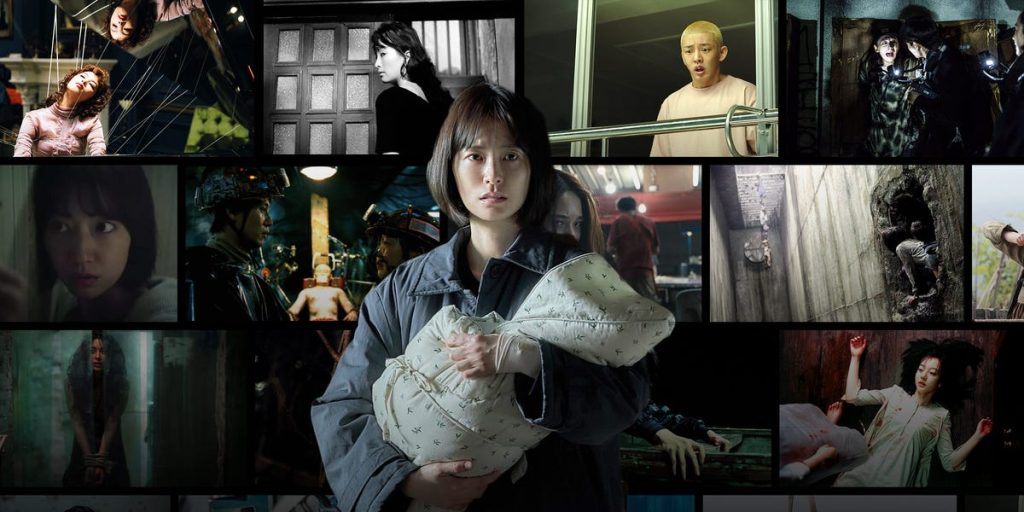Every product on this page was chosen by a Harper’s BAZAAR editor. We may earn commission on some of the items you choose to buy.
Spider Forest (2004)

Song Il-gon’s Spider Forest follows Kang Min (Kam Woo-sung), a traumatized TV producer who awakens alone in a forest and stumbles upon a cabin with a grisly scene inside. He finds his girlfriend, Su-young (Kang Kyung-hun), gravely injured and a man murdered with a sickle. When the killer flees, Kang Min pursues but is struck by an SUV and later awakens in a hospital two weeks later with few memories. Detective Choi (Jang Hyun-sung) visits Kang Min and reveals that he is now the prime suspect since his fingerprints are on the weapon. As Kang Min struggles to piece together his fragmented memories, dreams and reality blur, leaving him uncertain whether he is actually the one to blame.
Monstrum (2018)

Directed by Heo Jong-ho, Monstrum is a historical horror movie set during King Jungjong’s reign. A mysterious beast terrorizes the kingdom, prompting royal guard Yun-kyum (Kim Myung-min), his daughter (Lee Hye-ri), and allies to investigate. Blending palace intrigue with monster mayhem, the film reveals that political corruption is as dangerous as the creature itself.
Advertisement – Continue Reading Below
A Tale of Two Sisters (2003)

Inspired by a Korean folktale, Kim Jee-woon’s Gothic psychological horror centers on Su-mi (Im Soo-jung), a teenage girl who is returning from a psychiatric facility to live with her sister Su-yeon (Moon Geun-young), their new stepmother (Yum Jung-ah), and their aloof father (Kim Kap-soo). The house is plagued by sinister sounds and sightings, and a vengeful spirit begins to haunt the girls and their cold stepmother. Su-yeon appears to be especially impacted, while their stepmother becomes increasingly cruel. When Su-mi decides to confront her and learns the true nature of the haunting, the truth about their family trauma and her own mental illness unravels in devastating fashion.
The Call (2020)

Lee Chung-hyun’s The Call links two women across time through a mysterious phone line. Seo-yeon (Park Shin-hye) answers calls from Young-sook (Jeon Jong-seo), a woman who lived in the same house decades earlier. What begins as an unlikely friendship soon spirals into terror when Young-sook’s violent nature emerges. As Seo-yeon’s present shifts with each call, she battles to undo catastrophic changes while confronting destiny itself.
Advertisement – Continue Reading Below
I Saw the Devil (2010)

Kim Jee-woon’s brutal revenge thriller stars Lee Byung-hun as a secret agent hunting the serial killer (Choi Min-sik) who murdered his fiancée. Instead of killing him, the agent embarks on a sadistic game of capture-and-release, escalating their sadistic duel. The line between hero and monster dissolves as vengeance consumes both men.
Thirst (2009)

Park Chan-wook’s Thirst reimagines vampirism as both curse and liberation. Priest Sang-hyun (Song Kang-ho) becomes a vampire after a failed medical experiment, and he struggles to reconcile his faith with his newfound bloodlust. When he falls in love with Tae-ju (Kim Ok-bin), the repressed wife of a friend, their affair spirals into murder, passion, and destruction.
Advertisement – Continue Reading Below
Train to Busan (2016)

In this action-horror film, director Yeon Sang-ho sinks his teeth into the zombie genre aboard a South Korean commuter train. It follows Seok-woo (Gong Yoo), a workaholic fund manager, and his estranged daughter, Su-an (Kim Su-an), as they board a train in Seoul to visit Su-an’s mother in Busan. Once they’re on, a rapidly spreading virus begins turning people across the country into flesh-hungry zombies, and one infected passenger sparks an outbreak on board. Alongside a group of survivors, including the heroic Sang-hwa (Ma Dong-seok), they fight their way to safety as society unravels outside. If you loved Bong Joon Ho’s 2013 post-apocalyptic thriller Snowpiercer, this one is for you.
The Host (2006)

In 2019, director Bong Joon-ho gained international recognition for his black-comedy thriller Parasite, which took home the Academy Award for Best Picture, becoming the first non-English film to win in the category. But devout horror fans already knew him for his 2006 monster film, The Host. The film begins when an American military pathologist orders toxic waste to be dumped into Seoul’s Han River, leading to the creation of a giant amphibious creature. Years later, the monster emerges, attacking civilians and abducting Hyun-seo (Go Ah-sung), the daughter of a riverside snack vendor named Park Gang-du (Song Kang-ho). While officials declare her dead and focus on quarantines and rumors of a “virus,” Gang-du receives a call from Hyun-seo, proving she is alive in the creature’s lair.
Advertisement – Continue Reading Below
Gonjiam: Haunted Asylum (2018)

What begins as a publicity stunt quickly spirals into real horror when a group of thrill seekers livestream their visit to the infamous Gonjiam Psychiatric Hospital. Among them, Wi Ha-joon plays the adventurous leader desperate to boost views, while Park Ji-hyun and Oh Ah-yeon embody crew members whose skepticism soon turns to dread. Director Jung Bum-shik uses the found-footage format to strip away safety, making every shaky frame feel immediate and raw.
Save the Green Planet! (2003)

Jang Joon-hwan’s audacious Save the Green Planet blends horror, science fiction, and dark comedy. Lee Byeong-gu (Shin Ha-kyun), a paranoid and drug-addicted beekeeper convinced that reptilian aliens are infiltrating Earth, kidnaps a powerful executive (Baek Yoon-sik) he believes to be one of them. With the help of his circus-performer girlfriend (Hwang Jung-min), Lee subjects the captive to disturbing torture in a frantic effort to extract information and prevent humanity’s downfall. The story ultimately finishes with a shocking twist.
Advertisement – Continue Reading Below
Three … Extremes (2005)

This anthology, directed by three Asian auteurs, includes Park Chan-wook’s Cut, Fruit Chan’s Dumplings, and Takashi Miike’s Box. Cut features a director (Lee Byung-hun) forced into a sadistic choice by a vengeful extra. Dumplings follows an aging actress (Miriam Yeung) who consumes grotesque delicacies to retain her youth. Box features Kyoko Hasegawa as a writer haunted by guilt, dreams, and repressed memories. Each story uses body horror and psychological torment to probe vanity, morality, and regret, making the anthology unforgettable in its grotesque artistry.
The Wailing (2016)

Directed by Na Hong-jin, The Wailing is a brooding folk-horror mystery about a rural village plagued by unexplained deaths after the arrival of a Japanese stranger (Jun Kunimura). Local policeman Jong-goo (Kwak Do-won) is skeptical until his daughter (Kim Hwan-hee) begins exhibiting signs of possession. Desperate, he turns to a shaman (Hwang Jung-min), igniting a harrowing struggle between spirituality, ritual, and reason. Xenophobia and desperation blur the truth, culminating in an unsettlingly ambiguous ending.
Advertisement – Continue Reading Below
The Medium (2021)

Banjong Pisanthanakun’s Thai-Korean co-production blends mockumentary with shamanistic horror. Set in rural Thailand, it follows a documentary crew observing Nim, a medium (Sawanee Utoomma) who claims to channel a local goddess. When Nim’s niece (Narilya Gulmongkolpech) shows signs of possession, rituals escalate into shocking violence.
Sleep (2023)

Blending domestic drama with supernatural dread, Jason Yu’s Sleep follows a husband (Lee Sun-kyun) whose nighttime behavior turns violent, leaving his wife (Jung Yu-mi) trapped between devotion and dread. As his nocturnal episodes intensify, ranging from sinister mutterings to dangerous acts, she seeks both medical science and shamanic rituals to explain the creepy phenomenon.
Advertisement – Continue Reading Below
The Housemaid (1960)

Regarded as a cornerstone of Korean cinema, The Housemaid explores how the domestic sphere can conceal the most destructive desires. Under the direction of Kim Ki-young, the story follows a middle-class music teacher (Kim Jin-kyu) whose household unravels after the arrival of a new maid ( Lee Eun-shim). At first, she seduces him, then she gradually asserts psychological and physical control over the family. What begins as a secret affair spirals into obsession, violence, and tragedy, exposing both the fragility of patriarchal authority and the anxieties of postwar society.
#Alive (2020)

Cho Il-hyung’s #Alive updates the zombie survival story for the digital age. Gamer Joon-woo (Yoo Ah-in) is trapped in his Seoul apartment as a viral outbreak spreads. Isolated, he relies on technology and willpower until he discovers fellow survivor Yoo-bin (Park Shin-hye). Together, they battle loneliness, fear, and the undead. The film emphasizes survival in a hyperconnected yet emotionally isolated world.
Advertisement – Continue Reading Below
Whispering Corridors (1998)

Directed by Park Ki-hyung, Whispering Corridors is the seminal Korean horror that helped spark the late-’90s “K-horror” boom. The film opens with a chilling phone call, as a teacher discovers that a deceased former student’s ghost still lingers in the all-girls high school. Shortly afterward, she is found dead, setting off a wave of fear among students.
The Witch: Part 1—The Subversion (2018)

Park Hoon-jung’s action-horror hybrid follows Ja-yoon (Kim Da-mi), a seemingly ordinary teenager living with her adoptive parents after escaping a secret laboratory as a child. Her quiet life unravels when she enters a talent show, revealing abilities that attract the attention of those who once experimented on her. As she’s pursued by a mysterious figure known as the Nobleman (Choi Woo-shik), Ja-yoon’s hidden powers erupt in an explosive display of vengeance.
Watch Next

Advertisement – Continue Reading Below
Readers Also Read
Advertisement – Continue Reading Below
Advertisement – Continue Reading Below

